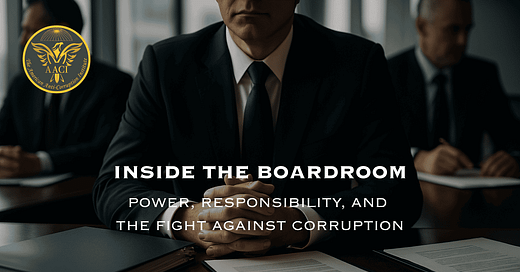Inside the Boardroom: Power, Responsibility, and the Fight Against Corruption
June 7, 2025
Introduction
What happens inside the boardroom rarely stays there. Decisions made—or avoided—by corporate boards shape the ethical posture of entire institutions. In high-risk sectors, that posture can determine whether corruption is prevented, tolerated, or rewarded.
This five-part premium series from Power & Accountability offers direct, unapologetic insight into how boards influence corruption risk—and what individual board members can do about it. Whether you're a newly appointed director, a seasoned non-executive, or a compliance officer advising your board, these posts are built for action—not reflection.
Each article breaks through the silence, inaction, and corporate theater that often surround board governance. We explore red flags, toxic power dynamics, leadership blind spots, and the steep costs of passivity—while equipping board members with sharp tools for integrity-driven oversight.
This series is based on The AACI’s Ten Principles of Fighting Corruption and decades of real-world advisory work across corporate and public governance. It’s not designed to inspire. It’s designed to prepare.
This series is for you if:
You're serious about strengthening governance in corruption-prone environments
You believe boards should do more than approve minutes and sign off on reports
You want a strategic lens rooted in ethics, accountability, and results
How a New Board Member Can Make a Real Impact Against Corruption
Part 1 of 5
Joining a corporate board is an honor. But in high-risk environments, it is also a heavy responsibility—especially when corruption risks are not just theoretical, but real and potentially costly.
At The American Anti-Corruption Institute (AACI), we believe that board members—particularly new ones—can either enable or disrupt corruption risks. There is no neutral ground. That’s why we offer this essential guide to help every new board member step into their role as a proactive guardian of ethical governance.
Below is a structured guide of Do’s and Don’ts—practical steps every new board member should take to help reduce corruption risks, strengthen oversight, and ensure long-term institutional integrity.
Keep reading with a 7-day free trial
Subscribe to Power & Accountability to keep reading this post and get 7 days of free access to the full post archives.





